![]()
“Lord, grant peace to the world. May wars and battles cease throughout the earth; protect the churches and monasteries; unite them in the unity of the true faith. Support and care for the people you have acquired through your precious blood. Thus, strengthened by your calm and peace, we shall render glory and thanksgiving to you, now and forever. Amen.” —From the Wednesday Morning Prayer after the Second Sunday after Epiphany, Maronite Liturgy. This prayer is from of the Family of St. Sharbel website (the name of St. Charbel can be written either as St. Sharbel or St. Charbel). This website is directed by a former combatant in Lebanon’s tragic civil war (1975-1990), a man who has now dedicated himself to spreading devotion to St. Charbel. Nearly 30,000 miracles have been reported in recent decades due through St. Charbel’s intercession (link)
“Today, on the feast of St. Charbel, the patron saint of Lebanon, we believe that he will not let Lebanon collapse. To Him we entrust our homeland and our people, seeking from Him as a miracle pleasing to God, the miracle of our salvation from this total collapse, by which we give thanks and glorify the Holy Trinity, the Father, the Son, and the Holy Spirit, now and forever, Amen.” —The end of a homily by Lebanon’s Maronite Patriarch Bechara Rai on July 24, 2021, feast of St. Charbel, (link to the text in both Arabic and English)
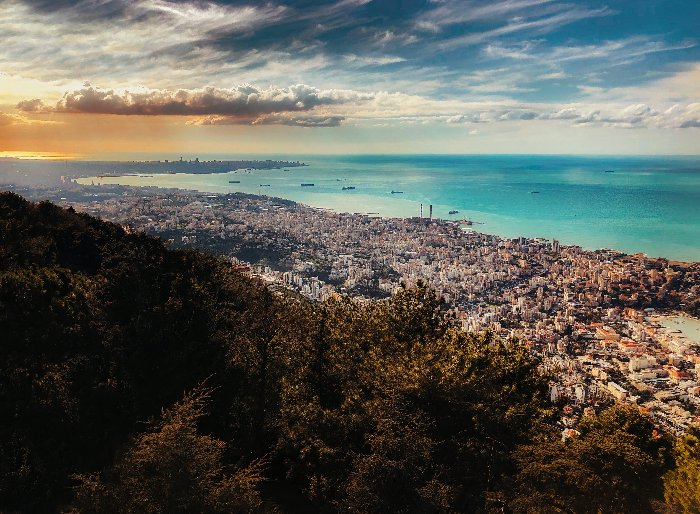
The Mediterranean Sea along the coast of Lebanon: this is a view of the sun setting over Jounieh, Lebanon, north of Beirut, with the city of Beirut itself in the far distance under the golden clouds [Photo by user nbarbaragha on unsplash com]
Lebanon Report 2023, #1: Monday, February 13
Looking on Lebanon with the Eyes of St. Charbel…
By Christopher Hart-Moynihan, Director, Friends of Lebanon Project (link)
***
Monday, February 13, 2023
Beloved Lebanon was spared from the terrible effects of the massive February 6 earthquake which has devastated southern Turkey and western Syria, where official figures now count more than 20,000 deaths, as aid workers says tens of thousands more may still remain undiscovered beneath the rubble.
Still, Lebanon faces its own grave problems.
We believe the country can find the spiritual and cultural resources to overcome every difficulty, if it moves forward in unity.
One of the greatest of those resources is the faith of the country’s people, in spite of all challenges and obstacles.
And that faith includes a devotion to a saintly monk who lived more than 100 years ago, but whose simplicity, humility and love of neighbor have become legendary: St. Charbel.
So the central message of this month’s Lebanon Report is that the difficult situation Lebanon faces is not the final word, that with faith and work and good will, the nation can recover its way, become prosperous, and at peace, and so be a symbol of what the human spirit can do for the entire Middle East and the entire world.
I send this letter, as I have sent previous Lebanon Reports, in the hope that some readers may become captivated by this vision, and decide to support our analysis and perspective so that this work can continue, and flourish. (Here is a link to our donation page, link).
During 2023 we will be sharing frequent updates on what is happening in Lebanon. Including:
1) a meeting of Lebanon’s Christian leaders on February 1
2) a decision of the government, also on February 1, to dramatically devalue the Lebanese pound
3) the death of an Irish peacekeeper working for the United Nations on December 14, in southern Lebanon
4) the recent earthquake in Syria and Turkey, which is a shocking and devastating tragedy for the entire Middle East region.
For now, however, I would like to focus on our work over the past year, and in the months ahead:
1) Our continued support for education for young people impacted by the Beirut explosion.
During a visit to Beirut in September 2022, we heard numerous stories of children whose parents were killed or injured on August 4, 2020.
Many of these young people have had to abandon their studies and look for work to support their family. Unitas: Friends of Lebanon continued our financial support to students in 2022, providing more than 40 high school and university students with scholarships and allowing them to continue their studies. Since the project was launched in 2020, we have supported more than 100 students with scholarships.
This educational aid is more essential than ever before. Midway through the fall 2022 semester, higher learning institutions in Lebanon began charging their students additional fees in order to maintain their operations (tuition fees were in Lebanese lira but due to the rapid devaluation of the lira schools and universities had to abruptly switch over to charging a fixed rate in dollars, which many Lebanese do not have). These students, who have faced unimaginable hardships, need continued financial support to achieve their goals of graduating and building their lives in their homeland.
Your help will benefit these young people greatly. Please give generously by joining our Friends of Lebanon initiative, which has been aiding those most in need since 2020.
Clara
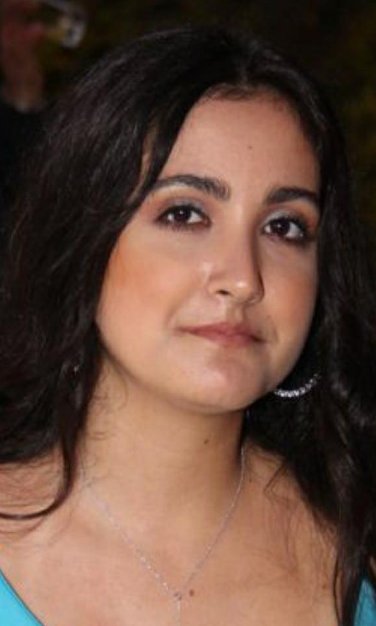
Clara is a second-year engineering student at Antonine University in Beirut, Lebanon.
Her father was in the military and is now retired. His salary is in Lebanese pounds; with Lebanon’s current hyperinflation the value of his salary is barely enough to keep food on the table.
Clara’s mother is unemployed due to health problems; she also has one sister. The family is subsisting solely on the father’s military pension.
Chris and Mabelle
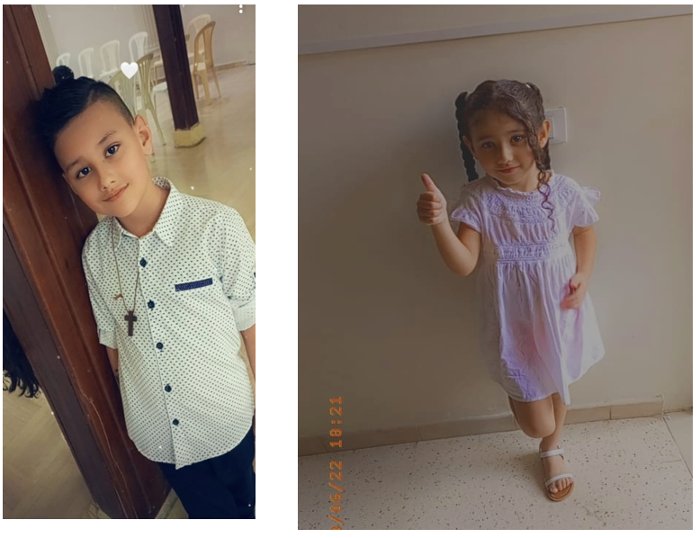
Two young children who study at Talaki School (in 1st and 2nd grade).
Their mother is unemployed and their father works as a maintenance man for air conditioning units.
Their house is rented and they have many bills to pay every month (including for the generator to provide electricity and heat).
Farah
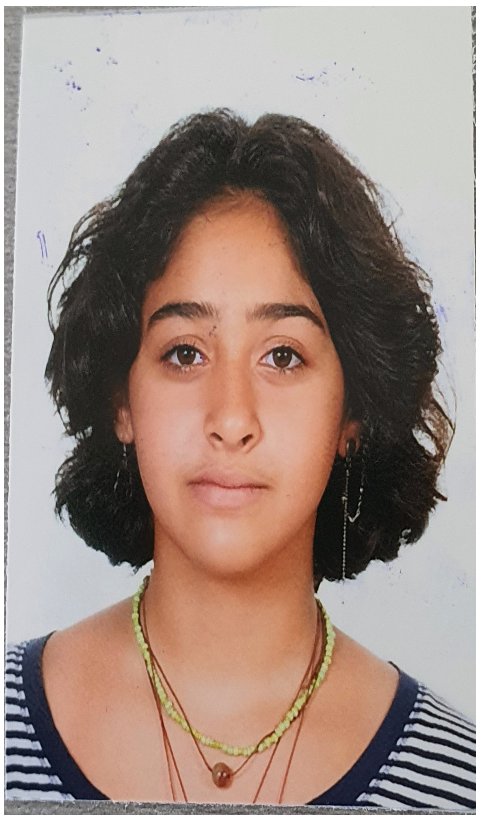 Farah lives with her mom Nada and her three brothers in Beirut. Her parents have been separated ever since she can remember. Her father has no connection with his kids and ex-wife at all and he left them in a destitute situation.
Farah lives with her mom Nada and her three brothers in Beirut. Her parents have been separated ever since she can remember. Her father has no connection with his kids and ex-wife at all and he left them in a destitute situation.
After being laid off from her job as a principal’s assistant last year due to the economic situation, Farah’s mom started selling cakes from her home until she started suffering from chronic body pain that hindered her movement altogether.
Nada’s three boys all suffer from ADHD, with one of them being on the high end of the spectrum.
Farah dreams of one day being a nutritionist selling her own home-made food and meal plans and a personal trainer.
Farah loves all kinds of sports but her favorite is track & field (running in particular) and her idol is Lebanese record holder Aziza Sbaity.
2) The visit of our Friends of Lebanon delegation to Lebanon in September 2022
This visit was the culmination of two years of work supporting the (primarily Christian) communities devastated by the August 4, 2020, Beirut port explosion. Our group sought to better understand the ongoing situation — especially the hopes and needs of the Christian communities in Lebanon — as well as experience Lebanon’s world-renowned religious pilgrimage sites.
Over nine days in Lebanon, from Beirut to the Qadisha (“Holy”) Valley, passing through the lovely towns of Byblos, Harissa, and Annaya, our group of 10 pilgrims was able to experience this “Land of Ancient Faith” in the flesh.
During meetings with religious leaders, such as Patriarch Bechara Boutros al-Rahi and the Guardians of the Holy Fire (a group of Orthodox Christian leaders in Lebanon) we began to concretize plans to hold a “Day of Unity” conference this September (see Point 3 below), with the goal of mobilizing support in order to help Christians stay in Lebanon, and in this way to support Lebanon’s special role as a stable country with a large Christian population.
Meetings with prominent intellectuals such as Dr. Habib Malik gave us invaluable perspective and insight into Lebanon’s history and current crisis. Dr. Malik in particular spoke about how Lebanon’s Christians are unique in that, throughout their history, they have struggled continuously against being subjected to the “dhimmi” status that other Christians in the Middle East experienced: broadly speaking, while Christians in Iraq, Syria, Palestine, and Egypt were reduced to second-class citizens, Lebanon’s Christians sought to live on equal terms with their Muslim neighbors.
This struggle eventually bore fruit in the form of the modern Lebanese state, which today is home one of the last significant populations of Christians in the Middle East — the original homeland of Christianity.
Finally, our meetings with recipients of our “short-term help” — in the form of food boxes and water purifiers — and “long-term hope” — in the form of financial aid for education — confirmed for us that the support from our donors has made a huge difference for blast-affected families in Beirut.
Now we must continue to help as they rebuild in the midst of an economic and financial crisis.
3) A “Day for Lebanon” in September 2023, centered around St. Charbel
During a January trip to the United Kingdom, Patriarch Bechara Boutros al-Rahi of the Maronite Catholic Church gave a speech to a group called Fellowship and Aid to the Christians of the East. In it, he revealed that he had submitted a formal request to the Secretary-General of the United Nations, Antonio Guterres, asking for a UN conference to be held on Lebanon.
The conference, the Patriarch stated, ought to focus on establishing a roadmap for the repatriation of Palestinian and Syrian refugees living in Lebanon, as well as drafting a Security Council resolution confirming Lebanon’s political neutrality.
As a group of concerned “Friends of Lebanon,” we would like to see the United Nations follow up on this request from Lebanon’s spiritual leader and begin organizing such a conference.
While the two issues mentioned by Patriarch Rai are complicated, they must be addressed through a process of dialogue between Lebanon’s factions before it is too late.
A certain degree of unity is necessary for such a dialogue to take place. This is why we have proposed a one-day conference, to be held this September, focusing on great spiritual and cultural figures in Lebanon.
One individual who has the capacity to unite Lebanese of all religions is St. Charbel.
The more we have learned about this remarkable saint over the past several years, the more we have become convinced that his life and miracles can be a source of hope as Lebanon and the greater Middle East traverse a period of great suffering.
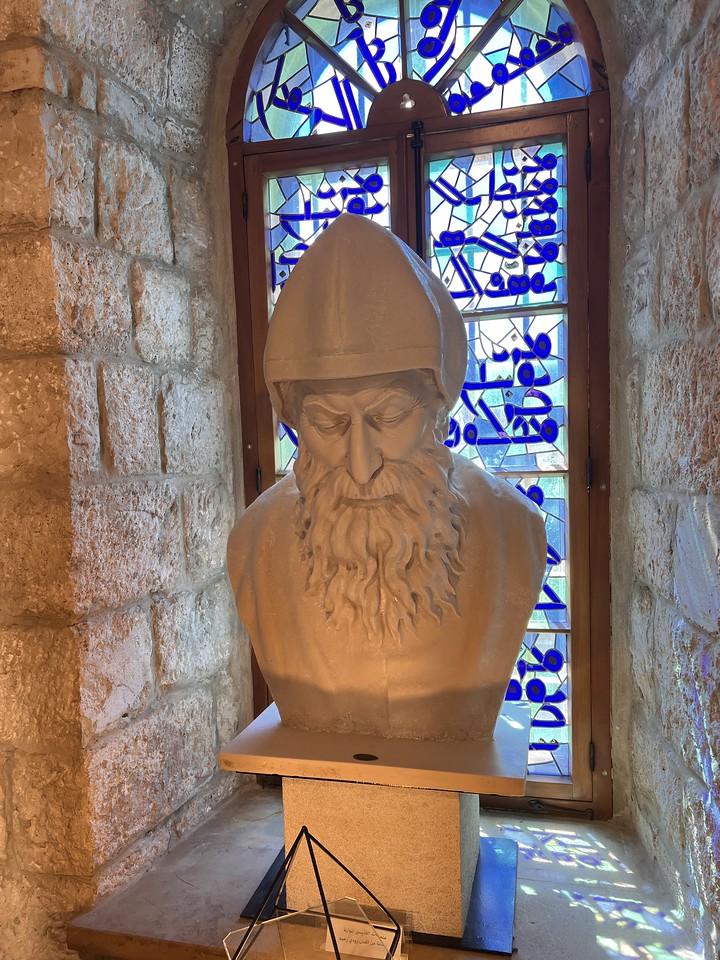
A bust of St. Charbel in the Maronite Patriarchate Museum in Bkerke, Lebanon, which we visited during our pilgrimage in September 2022.
St. Charbel
One of the most beloved figures in Lebanon is St. Charbel, the Maronite monk who was born in 1828 in Bekaa Kafra, high above the Qadisha Valley (Kahlil Gibran was born 55 years later in Bsharri, the town that faces Bekaa Kafra across the valley).
St. Charbel was born into a Maronite family and given the name Youssef Antoun Makhlouf. His parents were Antoun Zaarour Makhlouf and Brigitta Makhlouf.
When Charbel was just 3 years old, his father, Antoun Makhlouf, was taken to perform forced labor for the army of the Ottoman sultan, who at them time ruled over all of modern-day Turkey, Syria, Lebanon, Israel, and Greece. Antoun passed away shortly afterwards.
After the death of his father, Charbel was raised by his mother and later his stepfather, a man who took Holy Orders and became the parish priest of Bekaa Kafra.
Charbel was a quiet and thoughtful young man who felt called to the spiritual life from a young age.
At age 21, he left his family and went to live with the monks of the Lebanese Maronite Order in Mayfouq, near the city of Byblos.
Some time afterwards, he transferred to the Monastery of St. Maroun in Annaya, a small town in the mountains east of Byblos.
It was here that Youssef Antoun Makhlouf was given the name Charbel, which, according to several sources, means “Story of God” in the Syriac language.
In 1853, he took his final monastic vows and joined the order in Annaya, where he would spend most of the rest of his life.
Charbel’s fame for holiness and miracles grew during his life, and even more after his death.
Many years after his death, his body was exhumed and found to be incorrupt.
To this day, he has been credited with more than 29,000 miracles, for people from Christian, Muslim, Jewish, and Buddhist religious backgrounds, and even people of no religious background…
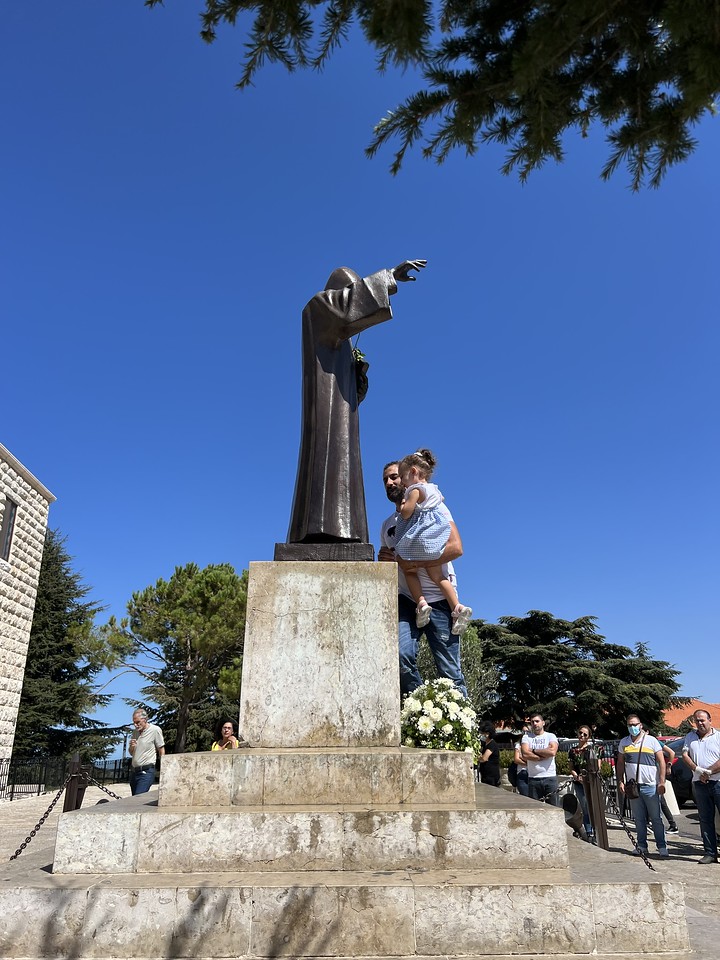
A father and daughter at the tomb of St. Charbel in Annaya, Lebanon. This photo was taken during our Friends of Lebanonpilgrimage in September 2022
Please consider becoming a “Friend of Lebanon,” and help us to bring “short-term help” and “long-term hope” to the land where Jesus Christ walked and performed miracles.
As a “Friend of Lebanon,” you will be able to participate in our Zoom calls with the people we are working with in Rome, Beirut, and throughout Lebanon to support Christians in their ancient homeland.
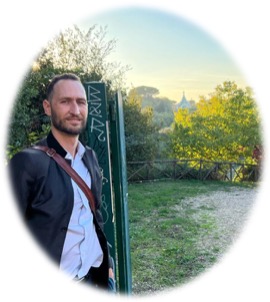 Please consider joining us.
Please consider joining us.
Christopher Hart-Moynihan
Director of Programs
Urbi et Orbi Communications
Please enjoy a complimentary digital edition of Inside the Vatican Magazine by clicking here.
